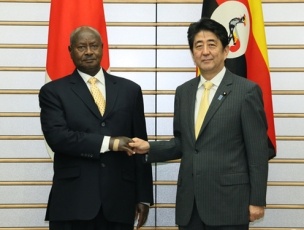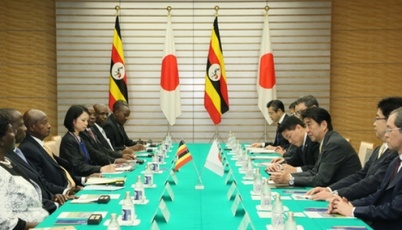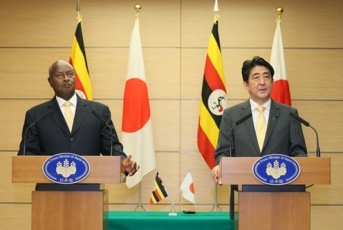Japan-Uganda Relations
Japan-Uganda Summit Meeting
 (Photo: Cabinet Public Relations Office)
(Photo: Cabinet Public Relations Office)
 (Photo: Cabinet Public Relations Office)
(Photo: Cabinet Public Relations Office)
 (Photo: Cabinet Public Relations Office)
(Photo: Cabinet Public Relations Office)
On September 10, commencing at around 6:20 p.m. for approximately 40 minutes, Mr. Shinzo Abe, Prime Minister of Japan, held a summit meeting with H.E. Mr. Yoweri Kaguta Museveni, President of the Republic of Uganda, who madean Official Working Visit to Japan. The overview is as follows.
After the meeting, the two leaders signed a joint statement (PDF) , and an exchange of notes concerning yen loans for the “Kampala Flyover Construction and Road Upgrading Project” was signed in the presence of the two leaders. Following that, a joint press occasion by the two leaders was held. Later, a dinner hosted by Prime Minister Abe and Mrs. Abetook place, and the conversation covered a wide range of topics concerning the relationship between the two countries, including the next Tokyo International Conference on African Development (TICAD), human resources development, education issues, and activities by Japanese non-governmental organizations (NGOs) in Uganda.
, and an exchange of notes concerning yen loans for the “Kampala Flyover Construction and Road Upgrading Project” was signed in the presence of the two leaders. Following that, a joint press occasion by the two leaders was held. Later, a dinner hosted by Prime Minister Abe and Mrs. Abetook place, and the conversation covered a wide range of topics concerning the relationship between the two countries, including the next Tokyo International Conference on African Development (TICAD), human resources development, education issues, and activities by Japanese non-governmental organizations (NGOs) in Uganda.
1. Opening remarks, TICAD
(1) Prime Minister Abe welcomed this 6th visit to Japan by President Museveni, a senior statesman of Africa and an old friend of Japan, expressing his gratitude for the President’s contribution to the TICAD process, and explained that Japan intends to present its unique contributions to Africa including quality infrastructure investment, human resources development, and realizing human security. Prime Minister Abe expressed his intention to cooperate with Uganda toward a successful TICAD.
(2) In response, President Museveni expressed his gratitude for Japan’s invitation, and stated that the relationship between Japan and Uganda had been a firm friendship backed by cooperation in a variety of fields, and that he wasthankful for the cooperation extended by Japan for 50 years. President Museveni also expressed his intention to cooperate with Japan on global challenges, and that he would like to invite Prime Minister Abe to Uganda.
Furthermore, President Museveni explained that this was his sixth visit to Japan, and four of those visits were to attend TICADs, and cooperation between Japan and Africa had become stronger throughTICAD.
2. Bilateral relations
(1) Prime Minister Abe expressed his intention to promote “quality infrastructure investment” that will contribute to Uganda’s national development, and to support Uganda’s growth by encouraging Japanese companies to establish businesses there, based on public-private partnership.
(2) In response, President Museveni once again expressed his gratitudefor Japan’s support in many fields for years, and explained Uganda’s own efforts in fields such as infrastructure, education and health, and expressed his expectation for Japan’s continuous support. The President also expressed his expectation over boosting export activity from Uganda to Japan and promoting investment in Uganda by Japanese companies.
3. Strengthening cooperation in the international arena
The two leaders shared the view that they will cooperate on the various issues facing the international community, including achieving the United Nations Security Council reform.

